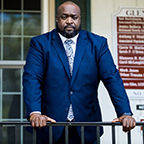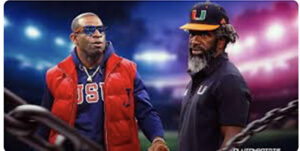

By Dr. Mark James
Introduction
Throughout American history, exploitation of African talent has flowed from the rivers of inequality to the backs of people who were once deemed three-fifths of a person and later faced the systemic force of racism, Jim Crow, and a lack of societal equity. One can agree to disagree that all these weights continue to counterbalance the inevitable weight of Black skin in America.
Historical Lens
Sports has been an outlet for Black America beyond merely being the entertainment center. They also provide cultural resilience opportunities, especially football, which attracts scholarships from HBCUs (Our historical only option prior to PWI’s deciding winning was more important than Bull Conners declaration of “Segregation, now and forever”) and PWI (Predominantly White Institutions) schools. Historically Black Colleges and Universities (HBCUs) recruit Black male student-athletes as promising students who may also have athletic talent. HBCUs provide an organizational culture that facilitates positive intellectual and psychosocial development for Black students, including Black student-athletes. The financial emphasis of collegiate athletics has implications for the recruitment of Black student-athletes, the lack of social resources provided to Black athletes, and the lack of socialization with other Black students.
HBCU athletics went from being the cornerstone of the Black community with dominant athletes throughout this country to a secondary choice for prospective athletes and families. However, today there is a resurrection happening on HBCU campuses all over this country that has sparked a thought that maybe Black people can resurrect HBCU athletics by calling on the ones who have been elevated in these billion-dollar systems of athletic performance. The Black male athlete is arguably the most critical stakeholder of these athletic departments within big-time college sports programs because their talent, image, and likeness sell to various consumer groups. In addition, the financial emphasis of collegiate athletics has implications for recruiting Black student-athletes. We are in a day when players now have the power to make their own choices and receive income for their labor in collegiate athletics. Yes, I must admit that at first glance, I thought that HBCUs might not benefit from the new wave of the NIL (Name Image and likeness); however, what Coach Prime has done in one year has helped to illuminate the pathway which African Americans abandoned more than fifty years ago as it pertains to college athletics, the choice of HBCU athletics.
The lens of the Commodity
Recently, Deion has taken his swag to the western mountains of college football. However, I am not writing this article to speak about what he is doing now, but instead on what he has done in changing the landscape of Black participation in leadership positions in college football. While at Jackson State University in Jackson, Mississippi, Coach Prime has made more splashes than a mermaid in a swimming pool. He has renovated, reinvigorated, and upset the status quo with a broad brush of asking America that we should not see the lack and interpret it as impossible when examining the inequities visible at Historically Black Colleges. The rationale of this article is to weave with enlightenment the historical need for HBCU athletics and its footprint in history with the relevance of the need to recover that slowly dissipated in the drain of haplessness and non-involvement.
Black America was divided when he took his current role. The divisor was that many people thought it was his duty to be the savior of Black college football and HBCUs in general. So, let us break that down and make it make sense without any emotion: $300,000 vs. 29.5 million; He played at FSU/NFL/MLB-How does that translate into owing the HBCU culture anything?; Why is the Black race the only one that looks to celebrities as their leaders instead of academicians? SMH
So now, as his division created based on his departure stewed in Black barber shops and cigar lounges across America, Ed Reid has become the head coach of Bethune Cookman University. Again, the same formula that bought Deion to Jackson was activated, but without the result. In less than a month: Hired without a formal process; No contract was signed, but I worked and recruited; An openly disgraced institution with closeted truths; Fired and players leading a boycott
Ed and Deion have one thing in common; they are commodities. They have played on the most critical stages, and their expective lens cannot comprehend the sometimes accommodation and lack of financial expediency of the typical HBCU. Firing Reid today proves that it is hard for a commodity to evolve and change HBCUs truly. Eventually, their need for more familiar grounds, such as facilities, recruiting budgets, and financial bandwidth to compete, takes over and becomes a reality. Reid, in his rants, made comments that captured this thought, like his statement that “he has done more in a week than others have done in many years at Cookman.” If he was not a commodity and BCU did not try to follow JSU’s steps without the necessary infrastructure, he would have understood that BCU (In the last 15 years) was once a national powerhouse in HBCU football. However, neither party thought that the education of the position was because of the leverage of his prestige and fame.
I had the opportunity to speak to the BCU team this year while they were on the road for four weeks straight due to damage on campus and playing JSU. I did not see the coaches as an issue. Instead, I thought the broken infrastructure kept them in hotels for four weeks straight. So I was surprised when BCU made a move with Coach Simms and even more surprised when I heard the name of his replacement.
The lens of the HBCU
Higher education has developed into a global-minded proposition that forces competition between nations and collegiate campuses. HBCU presidents face various leadership challenges due to fear of losing traditional students, inadequacies in recruiting diverse students, flaws in organizational structure, and traditional faculty opposition to change.
Several years ago, at the AFCA coaching convention, I sat in a room with seven HBCU head football coaches. At the time, I started a conversation that was unpopular with my colleagues and probably ignored by most, but I would have never guessed that it would have a prophetic value. The statement that I made was that HBCUs are going to move to hire commodities as head coaches rather than season coaches that have come up through the ranks of the HBCU world. In short, 3 of us no longer coach, and the remainder all lost their head coaching positions. FACTS!I only have one question for HBCU leadership: Why don’t we hire the fruit we produce?
Leveling the Ground
The only way to compete in a race must be to be honest about race. The race of inequality in athletics between HBCUs and PWIs has been run unfairly by those who can rule and set the rules for all. As PWIs continue to distance themselves from HBCUs institutionally,
HBCUs must hire the fruit they create. The bible states “that every seed reproduces after its kind.” If our institutions are ever so entangled with theology, we must remember that simplicity makes the wise look like a fool when they lose their roots. There is nothing wrong with hiring D1 talent to coach institutions, but it cannot be the remedy for a problem that is a lot larger than college football. It is about systemic financial inequities. In conclusion, Paolo Freire, in The Pedagogy of the Oppressed, speaks eloquently on the cycle of oppression. If he were alive today, he would advise our beloved HBCUs to be careful that the oppressed do not become the oppressor in the false narrative of freedom.
About the author: Dr. James is a former Head College Football coach with over 20 years of experience working with students toward academic and athletic development success in the classroom and society. He is a current researcher and advocates for equity and advancement for HBCUs.


Be the first to comment